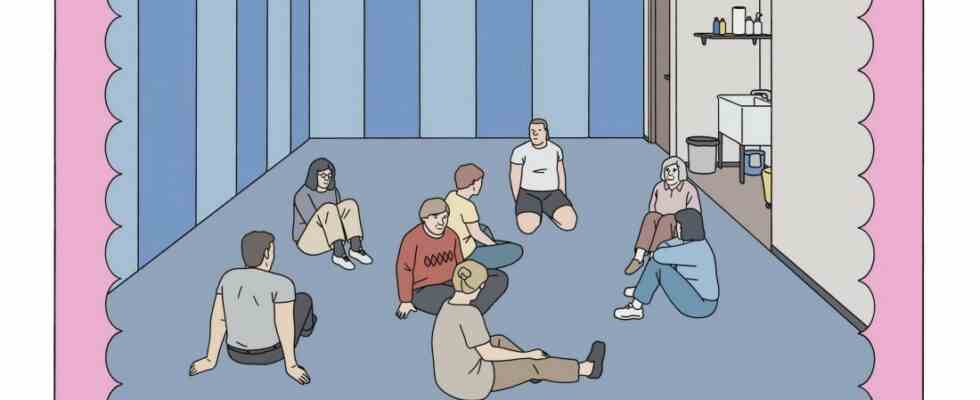His name is John Smith, a name he says is easy to forget. But John Smith is the pivotal figure in Nick Drnaso’s new book, who, with “Sabrina,” drew the first graphic novel to be nominated for the legendary – literary – Booker Prize. His new work is called “Acting Class” and John Smith is the teacher of this class, a life coaching business with which he messes up the lives of ten very average Americans – the first four hours are free, to try out. This one isn’t about acting acting class – but about acting in general, about acting, about acting out problems.
What he is about, he shows his students in the caretaker Wade, who is just wiping the loading dock … “Look, his movements. His flowing rhythm, like a dancer. The loading dock is his stage. See how he masters it. That has no method. It is pure presence.”
Motherhood doesn’t guarantee happiness either, in fact it can be a surreal, frightening experience.
(Photo: construction/flower bar)
John Smith is a pro, a methodical teacher, a mastermind, one who maneuvers people into and out of roleplays, motivates and manipulates them. “The beginning of the course always gives me so much strength, especially now, in this gloomy, cold time…”, he explains at the beginning with frivolous coquetry. The games he makes are utterly commonplace. A major goal that he could pursue with his program cannot be identified. “You will look someone in the eye and intuitively understand your relationship to each other… It’s like a Ouija board. You all tell a story, but who moves the pointer?” The moment he says that, there’s an animal grin on his face.
It’s all there in this story, in the life of the ten characters, loneliness and disappointment, memory and suppression, indifference and apathy, humiliation and masochism, even hope for self-determination. A married couple has grown apart, a mother is overwhelmed by her toddler, a young man who works as a model for painting courses suddenly no longer wants to pose naked, another is completely uptight and is confronted with accusations that he had in his youth little boys sexually abused… These everyday stories become really spooky when the normal and monotonous in them suddenly breaks open through the grotesque and surreal. One is arrested by nasty police officers and put in prisoner’s uniform, he has to clean the toilet in his cell with his tongue. “Finally, you lick the base. Get the dirt out of every corner.”
Cynicism born of isolation
That’s a lot of hard, disturbing stuff for a young narrator, Nick Drnaso was born in 1989, and in his youth he was fascinated by gruesome murders or the Chernobyl nuclear disaster. At the age of ten, he says, he was sexually abused by a boy next door, and as a result there were repeated depressions. “So it simplifies things a bit if you fabricate a narrative around them to create a cause and an effect.” Especially during the isolation caused by the Covid lockdowns, the stories of the “Acting Class” offered a kind of reprieve and shelter, a feeling of security. “It allowed me to imagine and live in a community.” One shouldn’t expect too much from this narrative, from this community. Nick Drnaso doesn’t weave a logical story, but rather an expanding fabric with many loose ends. Whenever you think you can see through a character or a situation, he causes everything to tip over again in the next picture.
John Smith (bottom left) and his acting class.
(Photo: construction/flower bar)
The frontispiece on the first page is in vivid colors, below figures in empty outlines, as if intended for children to color in. The impression is deceptive, the life that then develops in the book is of desolate monochrome, always evenly lit, the rooms furnished without inspiration, beige and gray dominate, places for American sadness, for petty-bourgeois neuroses of a despondent society. The faces of the ten people are simply drawn and can hardly be distinguished, no individual emotion can be seen on them, only helplessness and boredom. Most of the time they stand or squat around the classroom waiting for John. The precise, varied design of the sections and perspectives, the graphic mise en scenemakes a mockery of the meaninglessness, the boredom of this life.
The book is an incredible tour de force between isolation and immersion – and there is, explains Nick Drnaso, a streak of cynicism that comes from isolation. Again and again one slips into an imaginary, dreamlike world and wakes up in surprise, without a situation having been clarified, without a pain having been healed. The narrative that Nick Drnaso speaks of has many gaps and remains mysterious and monstrous until the very last frame.
Nick Drnaso: Acting Class. Translated from English by Daniel Beskos and Karen Koehler. Construction/Flower Bar, Berlin 2022. 268 pages. 28 euros.
(Photo: Construction/Blumenbar Verlag)
Towards the end it goes outside, with lots of air and nature, but everything continues to contract around the figures, the fifth hour begins. Does it amount to a conspiracy theory after more than two hundred and fifty pages? Nine of the ten students drive off with John Smith. It’s a conspiracy without conspirators that leaves you perplexed, like in the David Lynch films. “We bring talent together from all over the country. That’s where the real work starts,” says John. At that moment, the grin is back on his face and his eyes shine menacingly.

